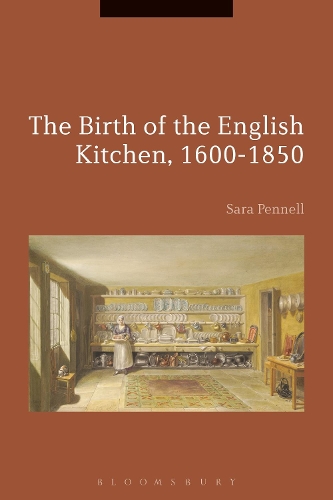
The Birth of the English Kitchen, 1600-1850
(Hardback)
Available Formats
Publishing Details
The Birth of the English Kitchen, 1600-1850
By (Author) Sara Pennell
Series edited by Beat Kmin
Series edited by Professor Brian Cowan
Bloomsbury Publishing PLC
Bloomsbury Academic USA
30th June 2016
United States
Classifications
General
Non Fiction
Cultural studies: food and society
European history
643.309410903
Physical Properties
Hardback
272
Width 156mm, Height 234mm
558g
Description
Tracing the emergence of the domestic kitchen from the 17th to the middle of the 19th century, Sara Pennell explores how the English kitchen became a space of specialised activity, sociability and strife. Drawing upon texts, images, surviving structures and objects, The Birth of the English Kitchen, 1600-1850 opens up the early modern English kitchen as an important historical site in the construction of domestic relations between husband and wife, masters, mistresses and servants and householders and outsiders; and as a crucial resource in contemporary heritage landscapes.
Reviews
One of [Sara Pennells] great strengths is her painstaking attempt to reconstruct everyday plebeian and middling kitchens despite scant evidence. She accesses every type of source imaginable, including published accounts, diaries, letters, probate documents, court cases, deeds, ephemeral advertising, architectural and cookery books, illustrations, and literary sources Pennells scholarship is not only impressive; her writing is accessible, elegant, and witty. * Journal of Design History *
A deeply impressive, immersive and multifaceted account. The study links production, consumption, technology, gender and social structure, the history of science, religion and the magical in creative, unexpected and suggestive ways. The author can justly claim to have definitively put the overlooked kitchen on the scholarly map. It is the ultimate historical sociology of the early modern kitchen. * Amanda Vickery, Queen Mary, University of London, UK *
This in-depth history of the early modern English kitchen is long overdue. Historian Pennell (Univ. of Greenwich, UK) analyzes past histories of the kitchen and their weaknesses, then provides a definitive yet nuanced, multifaceted, technical/social/religious/material/spatial/gender history of the kitchen up to 1850. Pennell establishes the absolute importance of the kitchen to any household, whether elite or plebeian. The final chapter, "The Kitchen Displayed," examines the kitchen in historic houses today, suggesting ways to rethink those spaces and interconnect various disciplines that touch on the role of the kitchen--"the sensory realm of the pre-modern kitchen should not just be left to baking smells." A welcome addition for public historians and early modern English historians, as well as those merely interested in kitchens. Summing Up: Highly recommended. All levels/libraries. * CHOICE *
Author Bio
Sara Pennell is Senior Lecturer in History at the University of Greenwich, UK. She is the co-editor, along with Michelle DiMeo, of Reading and Writing Recipe Books, 1550-1800 (2013).
